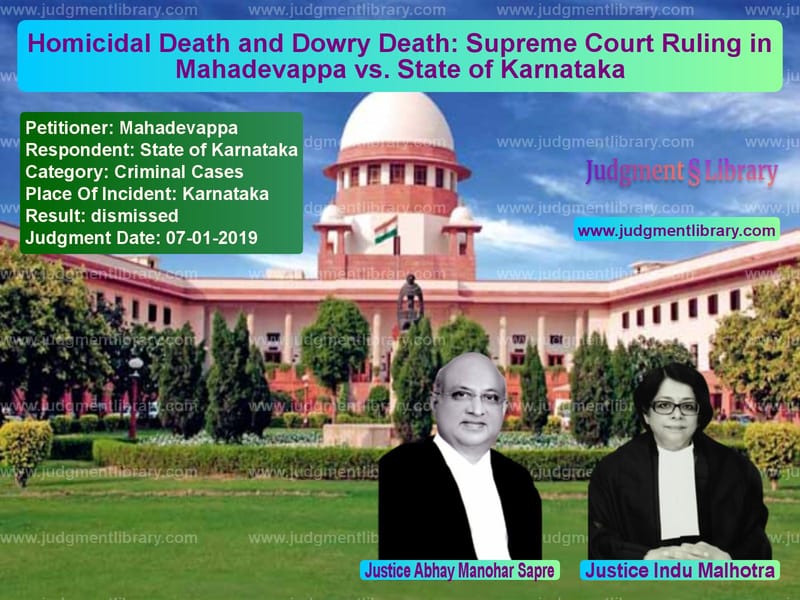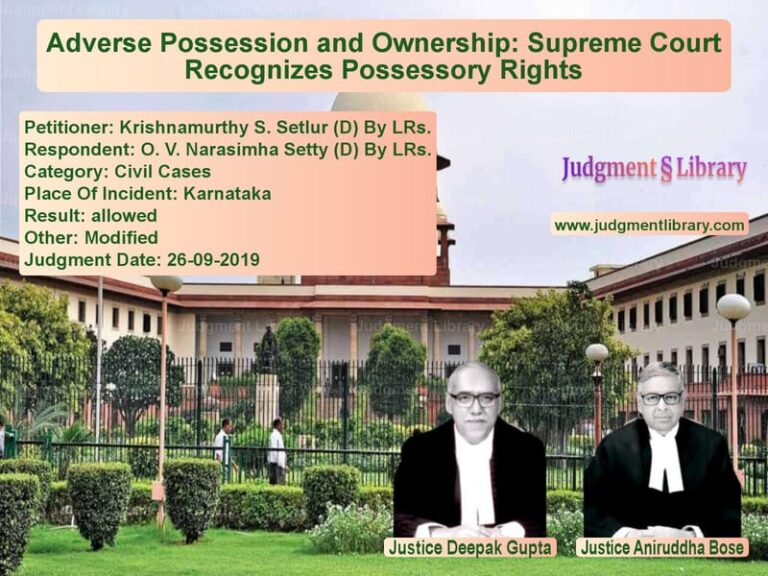Homicidal Death and Dowry Death: Supreme Court Ruling in Mahadevappa vs. State of Karnataka
The case of Mahadevappa vs. State of Karnataka concerns the tragic death of Rukmini Bai, the wife of the appellant, Mahadevappa. The appellant was accused of causing her death by setting her on fire, allegedly due to her failure to meet the appellant’s dowry demands. The incident occurred on 2nd October 1995, when Rukmini Bai was admitted to the hospital with severe burn injuries. She later succumbed to her injuries. The appellant was initially acquitted by the Sessions Court, but the High Court reversed the decision and convicted him for the offenses of dowry death under Section 498-A and murder under Section 302 of the Indian Penal Code (IPC). The appellant then appealed the decision in the Supreme Court, raising questions regarding the sufficiency of evidence and the applicability of Section 498-A and Section 302 IPC.
The appellant’s argument focused on the claim that Rukmini Bai’s death was accidental, as her sari allegedly caught fire while she was boiling water in the kitchen. The prosecution, on the other hand, presented evidence that suggested the death was homicidal, caused by the appellant intentionally pouring kerosene oil on Rukmini Bai and setting her on fire. The case became significant as it involved both dowry-related harassment and the question of whether the victim’s death could be categorized as a dowry death and homicide.
Background of the Case
Rukmini Bai, who married the appellant Mahadevappa on 4th June 1994, was allegedly subjected to regular harassment for dowry. According to the prosecution, Mahadevappa frequently demanded money from Rukmini Bai’s family, and she suffered both physical and emotional abuse due to his alcohol addiction and violent behavior. On 2nd October 1995, Rukmini Bai was admitted to the hospital with burn injuries. In her dying declaration, she blamed her husband, Mahadevappa, for setting her on fire by pouring kerosene oil on her. The police registered an FIR based on the dying declaration, and an investigation ensued.
The appellant denied the charges, claiming that his wife’s death was accidental and that her sari caught fire while she was working in the kitchen. The defense also questioned the reliability of the dying declaration and pointed out inconsistencies in witness testimonies. The Sessions Court acquitted the appellant, but the High Court, after hearing the appeal, reversed the decision, finding Mahadevappa guilty of both dowry death and murder.
Arguments by the Appellant (Mahadevappa)
The appellant’s counsel, Mr. Mallikarjun S. Mylar, raised the following points:
- There was no evidence to prove that the appellant demanded dowry from the deceased or her family, which is a necessary condition for invoking Section 498-A IPC.
- The prosecution’s case relied on the dying declaration, which was not reliable. There were discrepancies in the statement, and it could not be treated as conclusive evidence of the appellant’s guilt.
- The death was accidental, as the deceased herself had claimed that her sari caught fire while she was boiling water, and there was no direct evidence linking the appellant to the death.
- The acquittal by the Sessions Court was based on a proper appreciation of the evidence, and the High Court’s reversal was incorrect.
Arguments by the Respondent (State of Karnataka)
The respondent, represented by the public prosecutor, argued the following:
- The dying declaration made by Rukmini Bai clearly identified the appellant as the one who poured kerosene oil on her and set her on fire. This statement, along with other corroborative evidence, established that the death was homicidal.
- The victim’s family and other witnesses testified that the appellant had a history of ill-treatment and dowry demands, which supported the charge under Section 498-A IPC.
- The presence of kerosene oil on the victim’s body and the condition of her injuries pointed to a deliberate act of setting her on fire, not an accidental death.
- The High Court correctly overturned the acquittal, as the Sessions Court had failed to appreciate the material evidence properly.
Supreme Court’s Observations and Judgment
The Supreme Court reviewed the evidence in detail, particularly focusing on the dying declaration, the medical evidence, and the testimony of witnesses. The Court noted that the appellant’s version of events, suggesting an accidental death, was implausible. The Court also examined the credibility of the dying declaration and concluded that it was a reliable piece of evidence, corroborated by other testimonies and the physical evidence at the scene of the crime.
The Court observed:
“The dying declaration, which clearly implicates the appellant in the commission of the crime, is a crucial piece of evidence. The appellant’s defense of accidental death due to the sari catching fire is inconsistent with the physical evidence, including the presence of kerosene oil on the victim’s body.”
The Court further elaborated:
“There is no reasonable doubt that the death was not accidental. The circumstances, including the appellant’s repeated demand for money, his violent behavior, and the nature of the injuries, point to a clear case of homicide.”
Final Judgment
The Supreme Court dismissed the appeal and upheld the conviction of the appellant, Mahadevappa, for the offenses of dowry death under Section 498-A and murder under Section 302 of the IPC. The Court held:
“The conviction of the appellant under Section 498-A and Section 302 IPC is upheld. The evidence clearly establishes that the appellant was responsible for the death of Rukmini Bai. The appeal is therefore dismissed.”
The Court also affirmed the sentence of life imprisonment imposed by the High Court and directed the appellant to undergo imprisonment for the rest of his life.
Conclusion
The judgment in this case emphasizes the importance of dying declarations as a reliable form of evidence in criminal cases, particularly in cases of homicide. It also highlights the role of circumstantial evidence in establishing the cause of death and the motive behind the crime. The ruling reinforces the legal standards for the conviction of perpetrators of dowry deaths and homicides and serves as a significant precedent in the interpretation of Section 498-A and Section 302 IPC in cases of domestic violence and murder.
Petitioner Name: Mahadevappa.Respondent Name: State of Karnataka.Judgment By: Justice Abhay Manohar Sapre, Justice Indu Malhotra.Place Of Incident: Karnataka.Judgment Date: 07-01-2019.
Don’t miss out on the full details! Download the complete judgment in PDF format below and gain valuable insights instantly!
Download Judgment: Mahadevappa vs State of Karnataka Supreme Court of India Judgment Dated 07-01-2019.pdf
Direct Downlaod Judgment: Direct downlaod this Judgment
See all petitions in Murder Cases
See all petitions in Fraud and Forgery
See all petitions in Custodial Deaths and Police Misconduct
See all petitions in Judgment by Abhay Manohar Sapre
See all petitions in Judgment by Indu Malhotra
See all petitions in dismissed
See all petitions in supreme court of India judgments January 2019
See all petitions in 2019 judgments
See all posts in Criminal Cases Category
See all allowed petitions in Criminal Cases Category
See all Dismissed petitions in Criminal Cases Category
See all partially allowed petitions in Criminal Cases Category







